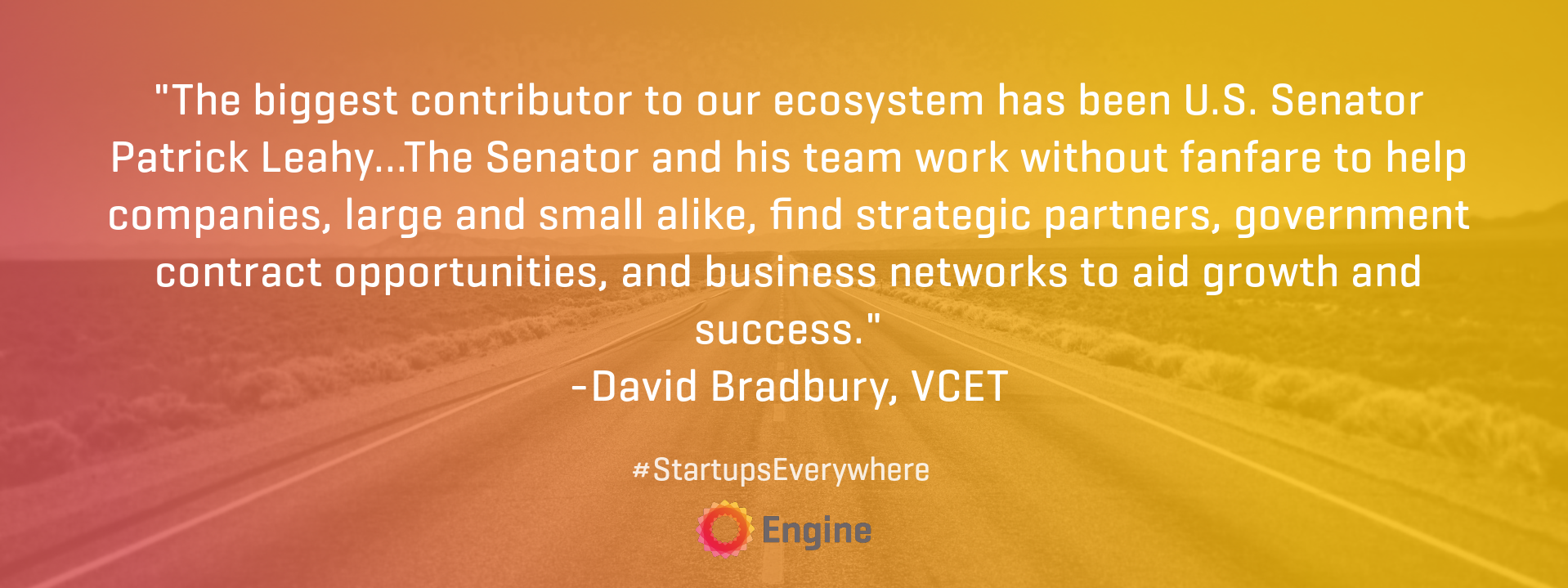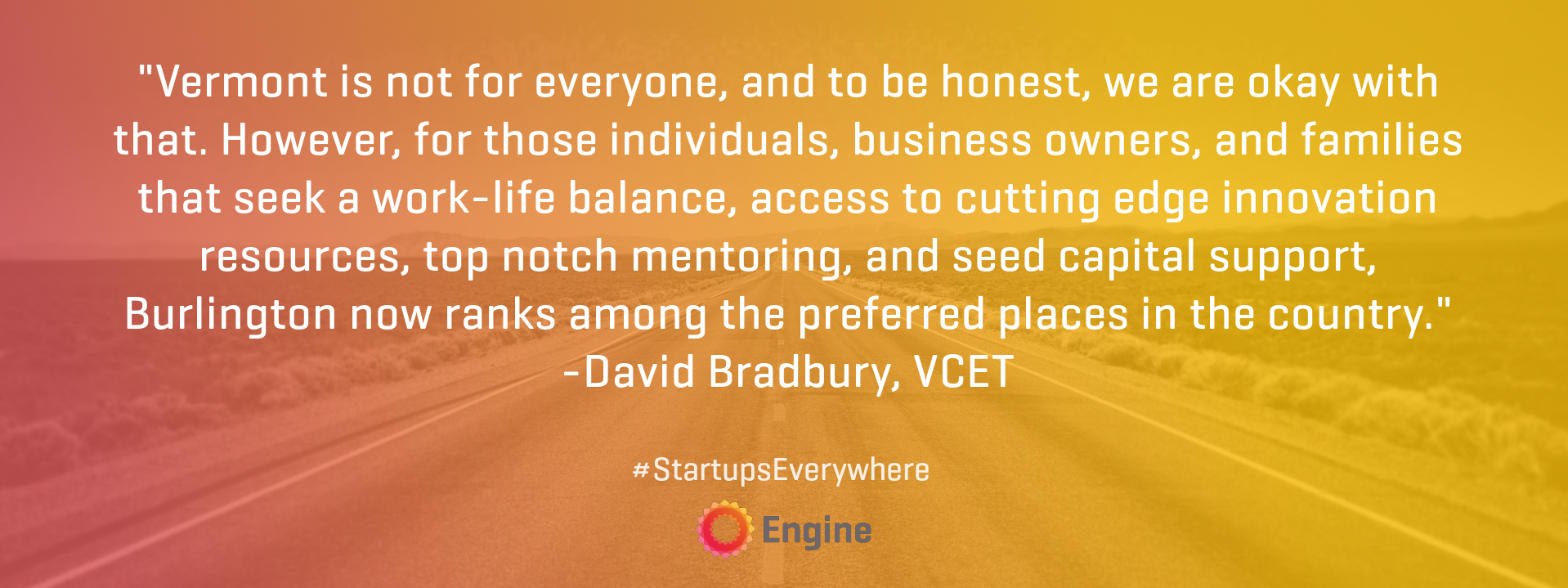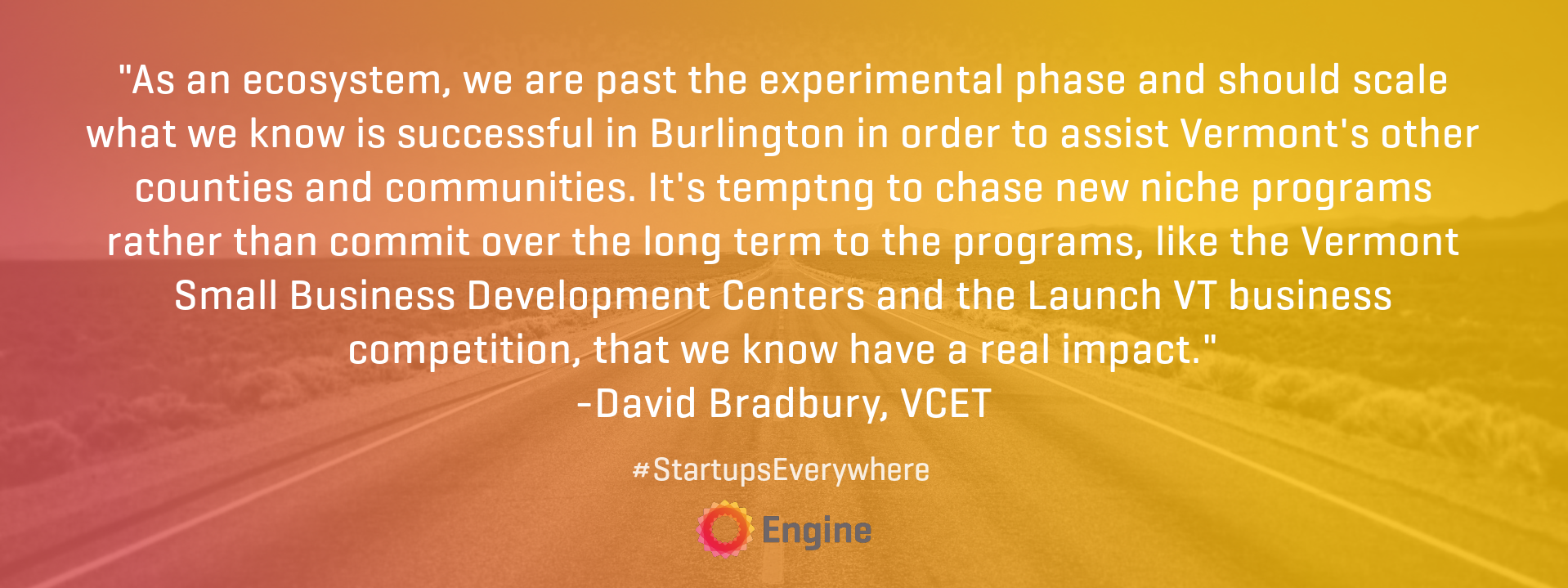#StartupsEverywhere Profile: David Bradbury, President of the Vermont Center for Emerging Technologies
This profile is part of #StartupsEverywhere, an ongoing series highlighting startup leaders in ecosystems across the country. This interview has been edited for length, content, and clarity.
With it’s tight-knit community and good work-life balance, Burlington, Vermont is the preferred place for many entrepreneurs. For this week’s #StartupsEverywhere, we talked to David Bradbury of the Vermont Center for Emerging Technologies. He attributes the area’s success to a few factors, including Vermont’s forward-thinking approach to blockchain technology, the state’s authorization of an early stage state-sponsored venture fund in 2009, and a big boost from U.S. Sen. Patrick Leahy (D-Vt.), who co-founded an incubator for Vermont’s entrepreneurs.
What’s your role in the Burlington-area startup ecosystem? How did you get involved working with startups in Burlington?
Over the years, I have been a founder, angel investor, mentor, adviser, and partner in dozens of startups in Burlington and around New England, such as Union Street Media and Game Theory. Since 2007, I have served as the President of the Vermont Center for Emerging Technologies (VCET), and as fund manager for the Vermont Seed Capital Fund, a $5.1 million evergreen venture capital fund. Working on new venture creation, innovation ecosystems, and technology based startups really began for me when I joined Governor Howard Dean's administration and started working in the Agency of Commerce as Deputy Commissioner of Economic Development. This role gave me the opportunity to travel Vermont and assist financing and growth challenges faced by Vermont companies. Along the way, I learned that there is one of three things up Vermont's dirt roadways: a dead end stonewall, a big, mean dog, or a world class entrepreneur. Our task is to travel those roads in search of the next opportunity.
Can you tell us more about what VCET does?
VCET attempts to provide key advantages to the entrepreneurs we serve by offering expert networks of people, innovation spaces in which to cowork, and direct investment from the Vermont Seed Capital Fund. Under one non-profit, public-benefit organization, Vermont's startups and scaling firms have access to VCET's proprietary network of “People, Places and Capital.” Each year our team assists over 250 startups and entrepreneurs, we produce over 40 entrepreneurial events and programs, host over 190 members within three coworking locations at the University of Vermont, Middlebury College, and within the Consolidated Communications Technology Hub in downtown Burlington, Vermont. So far, VCET's 50 lifetime portfolio companies have cumulatively reported having now raised over $172 million in capital, generated $133 million in revenues and supported payroll of $112 million. In 2013, VCET was named #11 globally and #5 in the United States by the UBI Index, which ranks higher education-affiliated innovation centers.
What’s the most exciting thing that has happened for Burlington in the past year?
In 2017, VCET launched our Start Here podcast (which is available on iTunes, Soundcloud, Google Play, and on Vermont Public Radio) to demystify and encourage the new venture journey for the active, aspiring, or accidental entrepreneur. Also last year, VCET launched the Female Founders Series with Burlington's Hotel Vermont. This sold-out series has featured the women's leadership team at Burton Snowboards, the co-founder of Vermont Creamery, the CEO of Game Theory, and the co-founder of Heady Topper, among others. Over 500 people have attended and the event has raised over $4,000 for non-profits, including the Vermont Women's Fund. The series is also broadcast statewide on public access channels.
What makes Burlington an ideal place to start a company? What is the biggest challenge you face in Burlington?
Vermont is not for everyone, and to be honest, we are okay with that. However, for those individuals, business owners, and families that seek a work-life balance, access to cutting edge innovation resources, top notch mentoring, and seed capital support, Burlington now ranks among the preferred places in the country. For startups, easy, early, and free access to expertise and resources like those offered by the Generator Makerspace, Champlain College's Emergent Media Center, or VCET's team can make all the difference when starting out. In addition, larger enterprises are accessible for joint research projects, as business mentors, and increasingly as the crucial early customers to validate a new product or service. There is a tremendous sense of community and "we" here. After all, it's only a matter of time before we have to push each other's car out of a snow bank.
As for major challenges, scaling a firm here can be tough given the small overall population. That said, businesses in energy, healthcare IT, consumer products, digital advertising, food and beverage, and advanced manufacturing all have ready workforces to pull from.
What industries have historically thrived in Burlington? How has this shaped the startup ecosystem there?
Pillar companies like Dealer.com (acquired by Dealertrack/Cox Automotive), Keurig Green Mountain (IPO), IBM's semiconductor facility (acquired by Global Foundries), IDX Systems (acquired by GE Healthcare), Ben & Jerry's, and Seventh Generation (acquired by Unilever), and a few others created new wealth, managerial, and technical expertise here in Vermont that has resulted in a rise in new companies and local investors in our area. The sectors are diverse, but all share a deep commitment to our state and a shared purpose for building sustainable, profitable and more vibrant communities into the future. The ecosystem has come a long, long way in the last decade -- it's exciting now to see it firing on all cylinders!
What are some of the inputs that have helped your ecosystem grow?
The biggest contributor to our ecosystem has been U.S. Senator Patrick Leahy. Along with the University of Vermont and the Vermont Technology Council, Senator Leahy co-founded VCET. The Senator also procured the initial $1 million for an evergreen seed capital fund in Vermont, which at the time (2009), was one of seven states without a state-sponsored seed fund. The Senator and his team work without fanfare to help companies, large and small alike, find strategic partners, government contract opportunities, and business networks to aid growth and success.
Another important input is the abundance of visitors, alumni and Vermonters who step forward to mentor, fund, and advise new and/or scaling companies. This talent pool spans industries from space to food systems, from semiconductors to craft beer, and medtech to transportation. This is the principal source for VCET's 100+ person mentor network.
Are there specific public policies or government initiatives that have enabled startup growth in Burlington?
At the state policy level, three initiatives are of note:
The first occurred when Vermont authorized the recognition of Public Benefit or B Corporations. This action acknowledged the fact that businesses for tomorrow should consider their impact on the planet, people, and other factors beyond profit.
The second is Vermont's efforts to become a domicile for blockchain-based companies to form. We are still in the early days of this movement, and a lot is still being sorted out, but the forward-looking approach is encouraging.
The third concerns the Vermont Seed Capital Fund, which was authorized by the Vermont State Legislature in 2009. A subsidiary of VCET was chosen as the fund manager and investing began in the May 2010. The $5.1 million fund is evergreen, focused on companies under $3 million in sales, and directed towards startups with a majority presence in Vermont. The Fund's portfolio companies (21 so far) have now raised over $116 million in total capital. Moreover, the presence of a second institutional seed investor in Vermont has provided more options and preparation for entrepreneur in addition to an expanded global capital network.
From a policy perspective, do you have any wishlist items for your startup ecosystem?
Mostly, I wish that public policy would focus on directing support towards programs that work well and deliver proven entrepreneur impacts. As an ecosystem, we are past the experimental phase and should scale what we know is successful in Burlington in order to assist Vermont's other counties and communities. It's tempting chase new niche programs rather than commit over the long term to the programs, like the Vermont Small Business Development Centers and the LaunchVT business competition, that we know have a real impact.
Are there some startups to watch coming out of the Burlington-area?
Startups and scaling firms in Burlington range from the edible to the unimaginable. Two beverage companies come to mind: Citizen Cider is experiencing massive growth, expanding production, and distribution of its award winning hard ciders. And new companies like Sap! Maple Beverages are selling sparkling beverages made from maple and birch tree waters for an all natural, superfood beverage. Towards the high-tech end of things, stealthy firms like Beta Air are making all electric flying vehicles and the team at Benchmark Space Systems are putting non-toxic, micro propulsion systems into cube satellites. More and more, we are seeing serial entrepreneurs who have done well here, or recently arrived to Vermont, start new technology and consumer product firms. Keep an eye on advertising technology firm, Fluency, whose founding team also started Burlington-based Dealer.com, which sold for nearly $1 billion.








